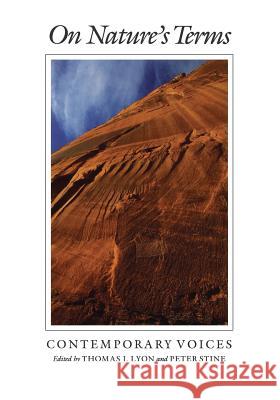On Nature's Terms: Contemporary Voices » książka
On Nature's Terms: Contemporary Voices
ISBN-13: 9780890965221 / Angielski / Miękka / 1992 / 212 str.
On Nature's Terms: Contemporary Voices
ISBN-13: 9780890965221 / Angielski / Miękka / 1992 / 212 str.
(netto: 88,33 VAT: 5%)
Najniższa cena z 30 dni: 91,61
ok. 30 dni roboczych.
Darmowa dostawa!
Outside, where the wind is blowing, we see the world on nature's terms, and we see that it is severely endangered. Turning inward, we seek a sense of connection with nature that could perhaps help us through the current environmental crisis. In this book, some of the most observant Americans of our day explore these outer and inner worlds in powerful pieces that show the vitality and range of contemporary nature writing. John Hay's "A Faire Bay," an original collection of thoughts on the pollution of the Chesapeake, opens the book, and Edward Hoagland's "A Year as It Turns," a group of short seasonal pieces that originally appeared as editorials in the New York Times, serves as the conclusion. Some of the other authors represented here include Rick Bass, Marcia Bonta, Charles Bowden, Jean Craighead George, Barry Lopez, Gary Snyder, and Terry Tempest Williams. Whether swimming with dolphins in the Florida Keys or stalking deer with the mountain lions, these authors experience and reflect on the terms nature sets and the terms we set for nature. With them, we discover the importance of the jack pine in the Boundary Waters, uncover the hidden beauty of Sonoran cacti, explore the very alive world of a Pennsylvania winter, visit the startling silences of the Canadian River Gorge in the Southwest, experience the breathtaking world of life on arctic ice, and view Venus at daybreak from the Grand Canyon. These are stories of place, and of family and friends, both human and nonhuman. They are tales of understanding and coming to terms with the world around us. THOMAS J. LYON, of Carlsbad, California, edited the journal Western American Literature for over twenty years. He taught at Utah State University and has received awards from the Utah Wilderness Association and Bridgerland Audubon Society. PETER STINE is the author of Survival, a collection of literary essays. He was the editor-in-chief of Witness from 1987 to 2008 and during that time received ten editorial grants from the National Endowment for the Arts. What Readers Are Saying: "While aiming for a wider audience, this collection attempts to bridge the gap from modern suburban and urban life to the wild. Drawing equally from lesser-known writers and from those who are already established, . . . the editors strive, through the eyes of the essayists, to make the reader see' the wild again. On the whole, they succeed. . . . it then compares it to a similar book and says it's the better buy because it's more comprehensive and reprints complete essays rather than excerpts]"--Library Journal " . . . an impassioned, personal, poetic and sometimes political cry from the heart, and from the heartland."--Salt Lake Tribune "Taken together, these essays are hallmarks of thoughtful, careful writing. They represent nearly every region in the country, indicting chemical pollution in Pennsylvania, the destruction of rivers in Texas, the massacre of cougars in New Mexico. It's just the sort of book to dip into before sitting down to write an angry letter to the folks in charge."--Outside Magazine "Thomas J. Lyon . . . has assembled some of the best contemporary nature writers in his most recent book, On Nature's Terms. . . . One of the most impressive essays in the collection is "The Afterlife," by Rick Bass . . . Bass has once again proven himself to be a master of the short essay-nature writing simply does not get any better than "The Afterlife." . . . This is a book to buy and treasure, loan to friends and family, and take on long trips to fill the hours."--Bloomsbury Review "There is something in this collection to delight and disturb everyone."--Okiotak (Anchorage Audubon newsletter)











